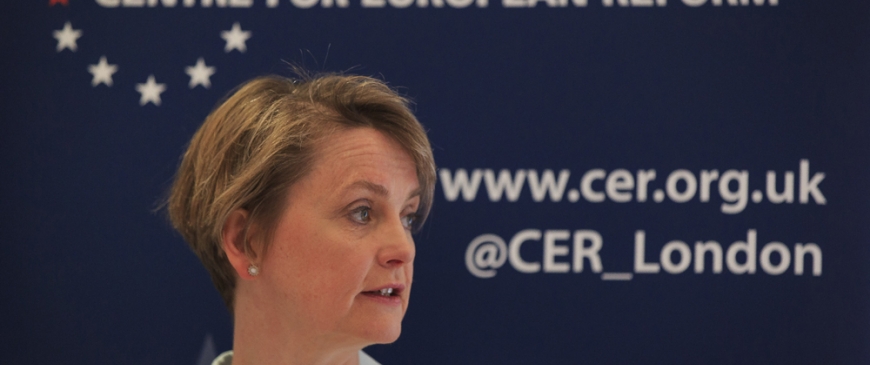
Cooper calls for national commission on immigration
Yvette Cooper, the former shadow home secretary and former Labour leadership contender, gave a speech to the Centre for European Reform this morning. The only clip I’ve seen on the news features a passage criticising Jeremy Corbyn, but it will be a shame if that is the only passage that gets picked up because the speech was very good. It is probably the most thoughtful response to the referendum I’ve heard yet from a British politician.
Here are the main points.
Cooper called for a national commission on immigration to develop a consensus on what immigration policy should be. This was important because Brexit would lead to immigration reform, she said, but at present there was no consensus on what it should be.
We need a national commission on immigration charged with building a consensus across the country – drawing together faith leaders, community leaders, trades unions, employers, the voice of the small towns and the big cities. We have to face this. Britain has benefited for centuries from people coming here from abroad. We need international talent and ideas. But we also need a system that is fair and has public consent. Or the divisions will grow and extremists will be able to exploit them.
She said parliament should set up a joint committee to consider the UK’s Brexit negotiation strategy. It should be a cross-party committee, featuring remain and leave figures, she said.
She said the Labour party should get access to the civil service to allow it to develop policy because an election could be imminent. By convention, the opposition parties are usually invited for talks with senior civil servants in the months before an election. She said:
And there needs to be direct access for the opposition to civil servants now too. The leading Tory party contender has said he is considering an general election. The prime minister has accepted there may be a case for an early general election, that may be only 4 months away.
I am therefore writing to Jeremy Heywood, the cabinet secretary, to ask him to trigger the process for access talks for opposition parties.
She said Labour should be pushing for the UK to have a “special relationship” with the EU.
We need to build a progressive, outward-looking Labour vision of Britain’s future alongside the EU – a new ‘special relationship’ with our European partners underpinned by Labour values – social solidarity, equality, social justice and human rights.
She said she hoped Jeremy Corbyn would resign.
At a time when the world has changed, when an election is looming, I am very concerned that Jeremy Corbyn has no plan to reunite the Labour movement, no plan to respond to the deep and serious issues the referendum has thrown up, and no plan for a looming general election …
I got to know Jeremy last year and I always found him a kind, friendly man. He won well and he has brought more people into the party. He did not lose the referendum – the prime minister lost the referendum he called. But Jeremy did not show he had any of the campaigning zeal our party needs in a tough fight.
But he is losing us Labour support across the country – and particularly in the towns and coalfields that built the labour movement in the first place.
Jeremy would be letting down Labour voters and communities across the country who badly need a strong Labour voice right now, and who badly need a Labour government, if he drags this out any longer. I hope he does the right thing in the party and stands down swiftly because we cannot drift and leave Boris Johnson, Theresa May and Iain Duncan Smith to shape Britain’s future.
She said it was important to understand why people voted to leave. They did not feel they had anything to lose, she said.
The cities voted in. Industrial towns voted out. Digital growth areas like the M4 corridor or the University towns voted in. The Tory shires and the Labour coalfields voted out. Scotland voted in. England and Wales voted out. The young voted in. Older votes chose out. Graduates in. Working-class communities out.
Those who saw globalisation as an opportunity voted in. Those who felt globalisation was a threat and didn’t trust “the system” to make it better voted out … Communities who didn’t believe the Remain campaigns arguments about risk because they didn’t feel they had much more to lose. People who said they didn’t believe “experts”, because too often experts have let them down ...
A Tory prime minister could not persuade them. Because a Tory government has let them down. But Labour had nothing to say that could convince them either. They weren’t convinced by staying in Europe because they couldn’t see how they benefited.
She said the leave vote was a sign that politics has failed.
We are here without a plan because politics has failed. Because our political process just couldn’t deal with the difficult issues so they got worse. Because too many of our politicians couldn’t work out how to solve problems so they made false promise or just walked away. Because too many towns feel they have no future. Because immigration seemed too hard to solve. Because the EU seemed too hard to reform. Because inequality is still rising and it seemed too hard to stop. Because we weren’t prepared to take action to sort out housing. Because trust collapsed. And with every layer of failure, politics just made it worse.
She said there was a “political vacuum” in Westminster because neither the government nor the opposition had a plan for Brexit.
